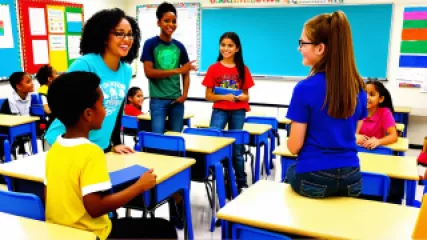10 Essential Educational Psychology Tips for Improved Student Outcomes
10 Essential Educational Psychology Tips for Improved Student Outcomes
As an educational psychologist, I've had the privilege of working with countless students, teachers, and administrators, all with the shared goal of fostering academic success and personal growth. Through my experiences, I've compiled a list of 10 essential tips that can help optimize student outcomes and support their journey in the classroom.
1. Embrace the Diversity of Learning Styles
Students come from diverse backgrounds and possess unique learning preferences. Recognizing and catering to these differences is crucial for ensuring that each individual has the opportunity to thrive. Incorporate a variety of instructional methods, such as visual aids, hands-on activities, and interactive discussions, to cater to the diverse needs of your students.
2. Foster a Positive Classroom Environment
The emotional and social climate of the classroom can have a profound impact on student engagement and academic performance. Cultivate a welcoming, supportive, and inclusive environment where students feel safe to take risks, express their ideas, and seek help when needed. Encourage peer-to-peer collaboration, celebrate student successes, and address any instances of bullying or discrimination promptly and effectively.
3. Prioritize Intrinsic Motivation
While external rewards and incentives can be useful, fostering intrinsic motivation is key to long-term academic success and personal growth. Help students develop a genuine interest in the subject matter, connect it to their own experiences and goals, and empower them to take ownership of their learning. This can lead to deeper engagement, better retention of information, and a love of lifelong learning.
4. Implement Formative Assessment Strategies
Frequent, low-stakes assessments can provide valuable insights into student understanding and progress. Incorporate formative assessment techniques, such as exit tickets, classroom discussions, and informal check-ins, to gather real-time data and adjust your instructional approaches accordingly. This allows you to identify and address learning gaps before they become more significant obstacles.
5. Differentiate Instruction
Each student has unique strengths, weaknesses, and learning needs. Differentiate your instruction to ensure that all students are appropriately challenged and supported. This may involve providing tiered assignments, offering flexible pacing, or adapting the learning environment to cater to individual needs. By differentiating, you can help students reach their full potential and avoid the frustration of one-size-fits-all approaches.
6. Promote Self-Regulation Strategies
Developing self-regulatory skills, such as time management, goal setting, and metacognition, can have a profound impact on student success. Teach and model these strategies, and provide opportunities for students to practice and apply them in various academic and personal contexts. Empowering students to take an active role in their own learning can lead to increased motivation, resilience, and academic achievement.
7. Emphasize the Importance of Feedback
Constructive feedback is a powerful tool for fostering student growth and learning. Provide timely, specific, and actionable feedback that focuses on the process rather than just the outcome. Encourage students to actively engage with feedback, reflect on their strengths and areas for improvement, and use this information to guide their future academic efforts.
8. Integrate Technology Thoughtfully
Technology can be a valuable asset in the classroom, but it must be used judiciously. Integrate technology in a way that enhances, rather than distracts from, the learning experience. Explore digital tools and platforms that can streamline administrative tasks, foster collaboration, and provide personalized learning opportunities for students.
9. Collaborate with Families and the Community
Student success is a collaborative effort that extends beyond the classroom. Establish strong partnerships with families and the broader community to support students' academic, social, and emotional development. This may involve regular communication, parent-teacher conferences, and the incorporation of community resources and expertise into the curriculum.
10. Prioritize Self-Care and Continued Learning
As educators, it's essential to model the importance of self-care and lifelong learning. Prioritize your own well-being, stay up-to-date with the latest research and best practices in educational psychology, and continuously seek opportunities for professional development. This will not only help you provide the best possible support for your students but also ensure your own longevity and fulfillment in the field.
By implementing these 10 essential tips, educational psychologists can empower students to reach their full potential, foster academic success, and support their overall well-being. Remember, each student is unique, and a multifaceted approach tailored to their individual needs is the key to unlocking their greatest achievements.
Key Takeaways:
- Embrace the diversity of learning styles and cater to individual needs.
- Foster a positive, supportive, and inclusive classroom environment.
- Prioritize intrinsic motivation to cultivate a love of learning.
- Implement formative assessment strategies to gather real-time data.
- Differentiate instruction to ensure all students are appropriately challenged.
- Promote self-regulation strategies to empower students.
- Emphasize the importance of constructive and actionable feedback.
- Integrate technology thoughtfully to enhance the learning experience.
- Collaborate with families and the community to support student success.
- Prioritize self-care and continued learning as an educational psychologist.
By following these 10 essential tips, educational psychologists can make a significant impact on student outcomes, fostering academic success, personal growth, and a lifelong love of learning. Remember, each student is unique, and a multifaceted approach tailored to their individual needs is the key to unlocking their greatest achievements.






